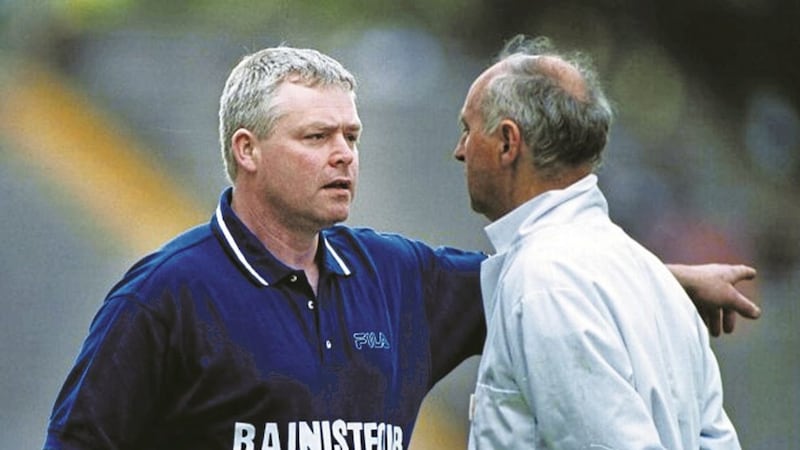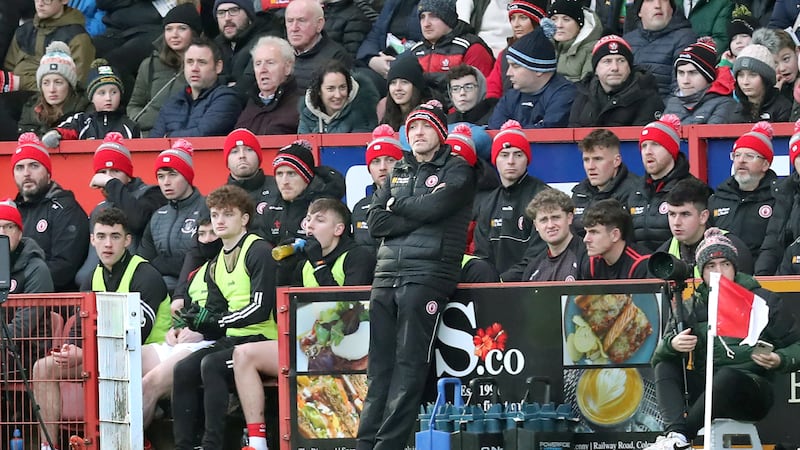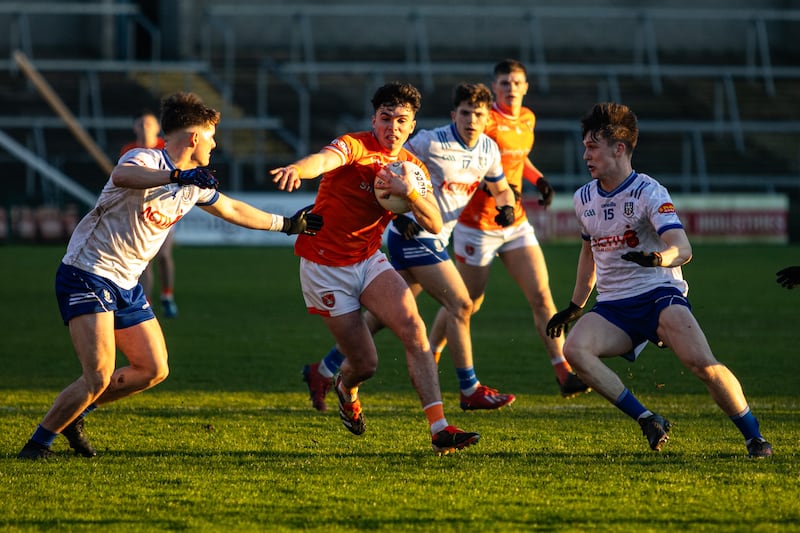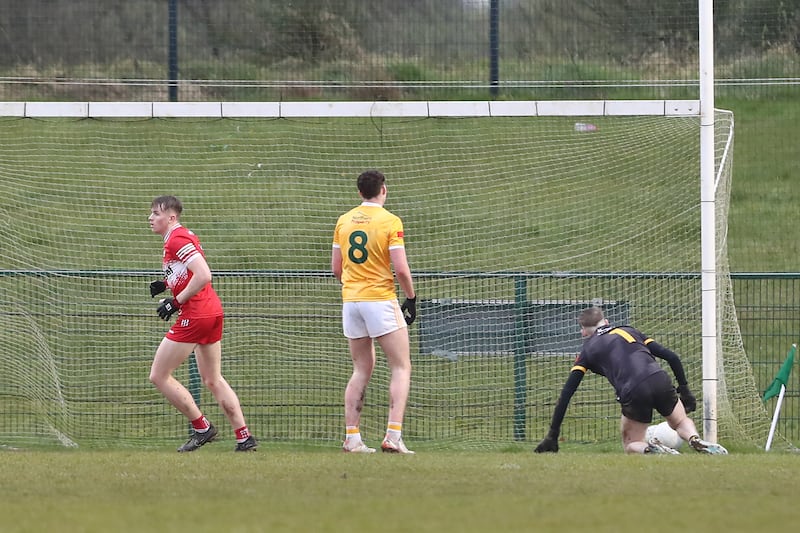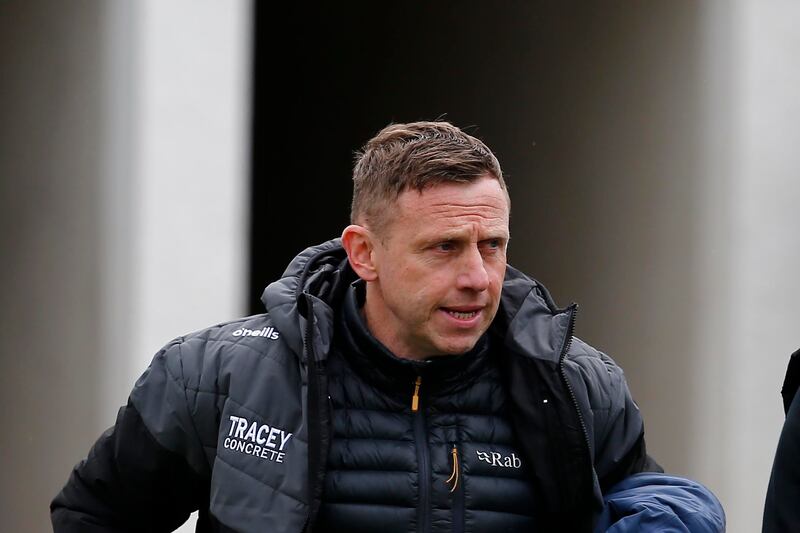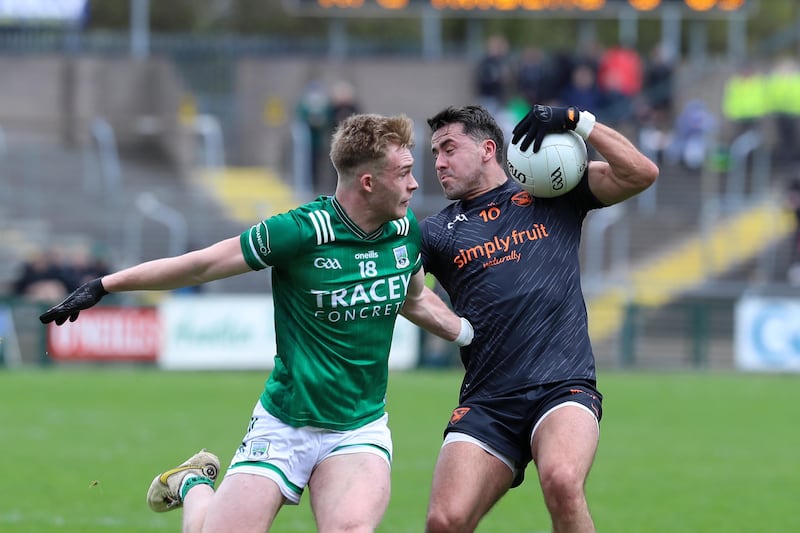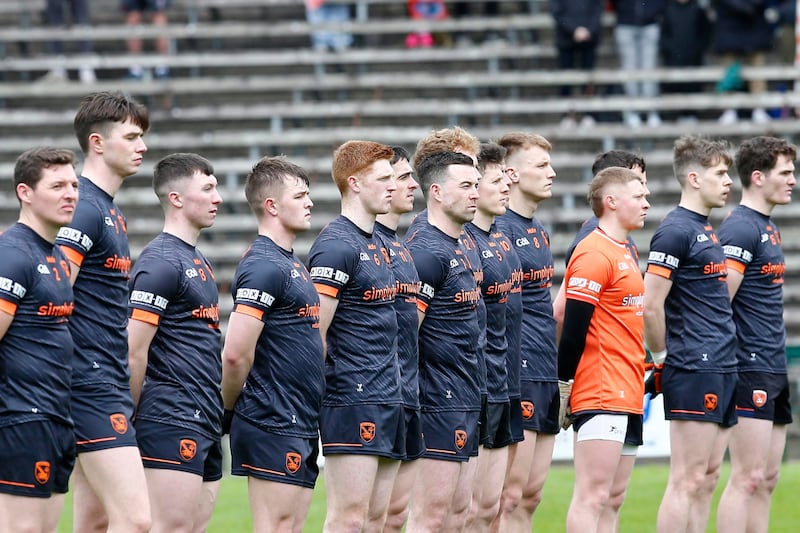ONLY crumbs remain of the scones and the coffee cups are cold and empty when we get to the why; why Brian McAlinden was able to drive himself and his team so hard during his years with Armagh.
“A lot of the players wouldn’t have been friendly with me when I was managing them,” he says.
“But they’re friendly with me now - most of them invited me to their weddings.”
And did it annoy him then that he wasn’t popular with his players?
“No,” he says, narrowing his eyes a little.
“Not in the slightest,” he adds, jabbing a thumb at his chest: “Because it was my county.”
My county. That’s the bottom line. McAlinden was prepared to grind whatever grist the mill required to make Armagh successful and, alongside Brian Canavan the other half of ‘The Two Brians’, he did.
Back-to-back Ulster titles in 1999 and 2000 and the brink of the Sam Maguire.
Coulda, shoulda…
Armagh didn’t get to a final during his time as joint manager but he prepared them for when they did in 2002, a year after he stepped down. That final came a quarter-of-a-century after McAlinden had played in the 1977 decider against Dublin and he learnt hard lessons from those days among a talented group of players who, he says, failed to maximise their potential.
“We could have won more if the team had been more disciplined and focussed,” he says.
“Not all the players, but if we had given more as regards attention to detail, focus, discipline we would have achieved more as a team because we had good players, really good players.”
He grew up in Derrytrasna, just outside Lurgan, and the High Moss Sarsfields pitch was across the road from his home. He started, as most goalies do, playing outfield but found himself between the sticks one day - he can’t remember when exactly - and stayed there.
“I must have started in an underage match in goals,” says McAlinden, who played one game for Glenavon in the Irish League (lost to Larne 4-2).
“I was the reserve goalkeeper for Sarsfields and at the start of the season the two managers told me: ‘You’re starting today’. The other fella had been the regular goalkeeper for about 10 years and he was already stripped out but they said: ‘We’re going to go with you’.”
Peter Makem brought him into the Armagh panel in 1975 and he’d established a reputation as a brilliant and innovative goalkeeper in the Stephen Cluxton mould who had won three Ulster titles in 15 seasons and played Railway Cup with Ulster and International Rules with Ireland when he decided to hang up his county jersey in 1990.
Immediately he switched his focus to managing his club.
Sarsfields were in Division Two when he took over but, right from their very first training session on January 16, the goal of winning the senior championship (they’d never even been to a final before by the way) was set.
“The only thing that was in our heads was winning the championship,” he says.
“We decided that’s what we were going to do and we went at it. There were fall-outs with wives and girlfriends - some of them aren’t talking to me yet.”
Even the disgruntled wives and girlfriends must have been smiling when Sarsfields beat three in-a-row-chasing Armagh Harps in the county final and went on to meet Derry’s Lavey in the Ulster Club Championship.
A still-disputed goal was allowed to stand by Antrim referee John Gough and Lavey emerged victorious on the way to winning the All-Ireland. It wasn’t the last time a McAlinden team would lose to the eventual champions.
HE stepped down as Sarsfields manager after the 1995 season and not long after that Brian Canavan was asked to become Armagh manager. That summer, the Orchard county had been on the receiving end of an Ulster Championship thrashing from Derry but Canavan said he would take the role if McAlinden went in with him.
“I got a call to go to a meeting to see if I was interested, which I wasn’t really,” says McAlinden.
“I had just finished with the Sarsfields and wanted to take a break but Brian was a good friend so I went and it ended up they gave it to us. We were probably the cheapest option!”
The Two Brians invested their time into combing the county for playing options and over their first three years they tried around 70 players while working to “put a wee bit more steel” into their squad.
“There was a north-south divide at times and we tried to wipe that,” says McAlinden.
“We told them: ‘You’re not playing for your club lads, you’re playing for your county’.”
The breakthrough came in 1999 when Armagh beat Down in the Ulster final. Towards the end, with the game won, Oisin McConville tried to chip Mourne goalkeeper Mickey McVeigh and if he’d succeeded delirious Armagh fans in Clones might have passed out with delight in the stands but the ball floated into McVeigh’s grateful arms.
McAlinden wasn’t happy.
“I gave off to him on the Tuesday night,” he says.
“He should have picked the ball up, went round him and buried it in the back of the net like Greg Blaney would have done with me.”
“Oisin says: ‘You’re never happy, sure we won by 11 points’.
“I said: ‘Aye well we should have won by 13 and that could cost you an Allstar’.
“He said: ‘You’re talking crap’.
McConville did miss out on an Allstar that year but he got his first the following year as Armagh regrouped and went again.
This time is was Derry in the final and McAlinden was up against his old friend Eamonn Coleman. Both men were superstitious. Throughout his career, McAlinden made a point of sitting in the same place in the dressing room – the second seat in from the door – and he always put his right boot on first and wore two pairs of socks whether it was summer or winter.
He found out that Coleman preferred the left-hand dressing room when Derry played in Clones and so he hatched a plot to deny it to him.
“We went up on the Saturday before the final for a dry run,” he says.
“I got talking to the groundsman. I gave him 20 quid and asked him to put our name on the dressingroom on the left-hand side and keep the door locked until we arrived on the Sunday. I said: ‘See me after the match and I’ll give you another 20’.”
When Armagh arrived at the ground on the Sunday they found the door locked alright but a bus load of Derry men had got there before them and were packing the narrow corridor outside the dressing room.
McAlinden explains: “Eamonn says to me: ‘Brian you’re messing here, you know we take this dressing room’.
“I said: ‘You’re not taking it today, we’re taking it – can you not read? Our name’s on it’.
“Our county chairman instructed us to go across to the other dressing room and myself and Brian told him: ‘If we’re moving anywhere, we’re getting back on the bus’.”
Fans streamed into St Tiernach’s Park unaware of what was going on beneath the stand and punches were thrown as players jostled outside door, which was still locked. Eventually the door was opened and Armagh got in.
“Before that Armagh had been happy enough to take what they got but the nice-guy thing had gone,” says McAlinden.
Armagh won the game and the Derry mentors were not best pleased but Coleman shook hands with McAlinden and conceded: “You beat us before the match started”.
“We wanted to put that into the players,” says McAlinden.
“We wanted that mental strength and we would have had fisticuffs in training. The games were intense and the boundaries of discipline were on the tipping point. I remember Kieran (McGeeney) and Justy (McNulty) coming to blows one night.
“They were both Mullaghbawn clubmen but they were passionate about playing for Armagh. There was an intense ‘this is my jersey’ feeling and you need that.”
McAlinden refereed the in-house matches and kept his whistle in his pocket for the most part. He picked that trick up from a conversation with legendary Clare hurling manager Ger Loughnane.
Armagh’s managerial duo were prepared to put the hours in to find little edges here and there. They drove to Ennis to meet Loughnane and then on to Cork for a chat with Larry Tompkins.
They also travelled to Glasgow to train at Celtic’s Barrowfield and pick Martin O’Neill’s brains and McAlinden even got a few tips from Rangers (yes, Rangers) manager Dick Advocaat and brought former Irish Army drill instructor Martin Callanan in to oversee the training.
“We tried all sort of things to build up a good spirit in the camp,” he says.
“The intensity and attitude and conviction to actually start winning Championships wasn’t there.
“Championships aren’t handed out, nobody gives them to you and sometimes you have to go to the line or over it to get the result. We were happy enough to do that and whether we were liked or disliked we didn’t really care because you’re only remembered when you’re gone if you win. You must win trophies.”
THERE were trophies in Ulster but the big one – the Sam Maguire – eluded Armagh. The Orchardmen came agonisingly close but lost intense encounters to the eventual champions three years’ in-a-row.
First there was Meath in 1999.
“We have to hold our hands up,” says McAlinden.
“Tony McEntee got hurt early in the match and we moved him to full-forward we probably should have taken him off. And we selected John Donaldson who had played for Louth the year before against Meath and do well but he didn’t get into the game that day. I have a regret on those things. Would they have changed the result? We’ll never know now but that’s the way it goes.”
Then Kerry.
“We had played Kerry in a challenge match in Limerick the year before. Paidi O Se rang me the week before and said: ‘Do not travel down unless you’ve a full team because you’re only wasting your time and, more importantly, you’re wasting my time’.
“They had a full strength team but the Cross players didn’t turn up. We were beat and it didn’t do us any good. Sometimes I felt like we were going two steps forward and one step back but I’m sure it happens in other county’s too. We didn’t have the numbers or the quality we would have liked on a consistent basis which would have propelled us a wee bit closer to success.
And finally Galway.
A one-point defeat against the Tribesmen was the end of the road.
“That’s how close we were,” says McAlinden.
“It was a journey and it was a tough journey. We did six years and maybe the dressing room was a bit stale. It would have been unfair to the players to hang on if somebody new could come in and push it on that wee bit more and get them over the line which is what happened with Joe (Kernan).
“I think Ronan Clarke was the difference in Armagh getting over the line. He was a bit too young when we were there and maybe there was a bit of luck that we didn’t get – thankfully Ray Cosgrove (Dublin) kicked that free out of his hands and it hit the post and Armagh got to the final in 2002.
“The teams that beat us won the All-Ireland. That might give you a bit of credit but it doesn’t get you any trophies but in the years after us Fermanagh and Wexford beat Armagh in Croke Park and Kerry gave us an awful hiding.
“If Fermanagh had beaten us in Croke Park in our time, myself and Brian... we wouldn’t have got home.”
SINCE those days of triumph and disappointment, McAlinden has managed underage teams in Armagh and returned to the senior squad as part of Kieran McGeeney’s management set-up.
Three of his four children have All-Ireland medals. Daughter Magdalene (Mags) is Armagh’s most recent All-Ireland-winning captain and Catherine (a chip off the old block) was the goalkeeper for that 2012 success. Grainne could have been in the team too but she had taken a year off to get married and missed out.
His son Thomas won an All-Ireland with the Armagh minors in 2009.
It’s no surprise that he’s had offers to manage other counties and clubs and his answer to them all has been the same: “Thanks, but no thanks”.
“If I was managing another team and we came up against my county or my club, I wouldn’t be there,” he says.
“I’m a two-team person – Sarsfields and Armagh. Full-stop. I wouldn’t entertain anything else. I’m not a mercenary, money doesn’t motivate me in the slightest – the only thing that motivates me is my club or my county going for success.”
My county.
//////////////////////////////////////////////////////
Brian McAlinden’s no-nonsense approach has been compared to Gunnery Sergeant Hartman, the US Army Drill Instructor from the movie Full Metal Jacket. Despite that he is respected and admired in the county and far beyond and his rapier wit and off-the-cuff one-liners are legendary. Here are a few I’ve heard over the years from men who played with, for, or against him:
One of the McEntee twins (they had switched jerseys): “You don’t know who I am, do you?”
McAlinden: “I do.”
McEntee: “Who am I?”
McAlinden: “You’re (name withheld). You’re the slow one.”
A player informs McAlinden that he has been on a diet and lost a stone in weight over Christmas.
McAlinden (As the player jogs off): “Here, I know where that stone you lost went.”
Player: “Where?”
McAlinden: “Your arse.”
Player: “Can I have a word with you?”
McAlinden: “What’s wrong?”
Player: “You’re making a fool out of me. This jersey is too small.”
McAlinden: “No. The jersey is the right size, you’re the wrong size.”
January pre-season training runs at Belvoir Park in Belfast were brutal. The Armagh panel were in the middle of a series of time-trial laps when a new recruit to the panel slips and twists his ankle.
McAlinden: “Stick your foot in that river and join us when we come back round.”
Any messing or lack of effort during training at David Park was punished by the team being sent to a corner of the field and told to sprint a lap or laps at full pace.
During a practice match one side managed a flowing move out of their defence. The ball was fisted across the goal and an unmarked player headed it into the net.
McAlinden, apoplectic with rage: “Right, everybody into the corner...”
